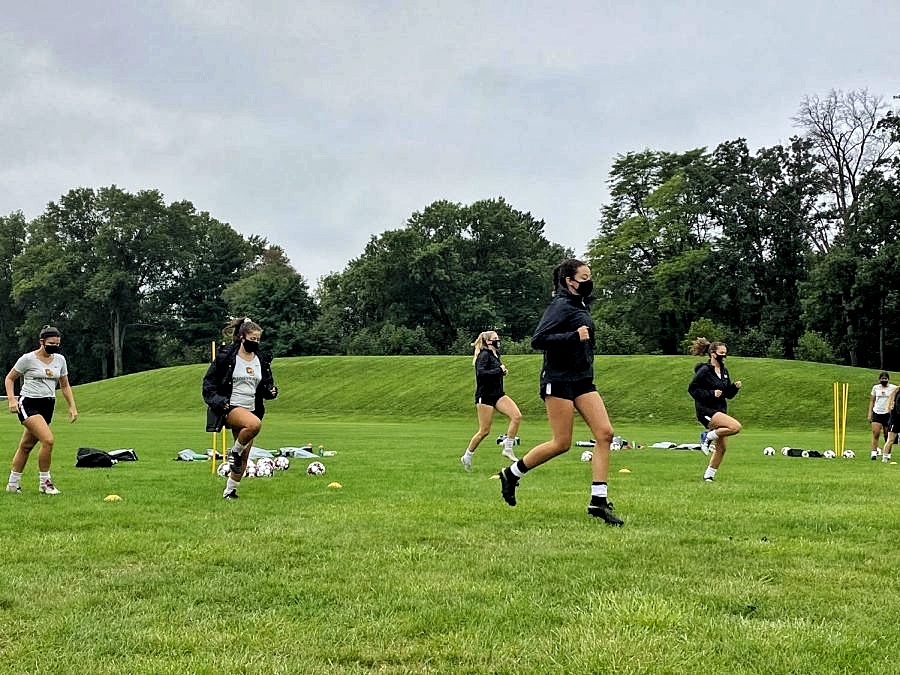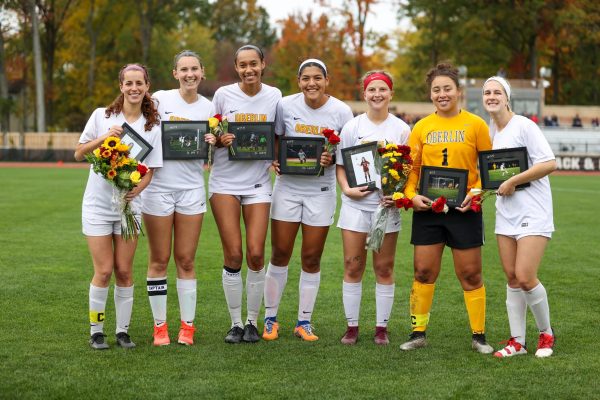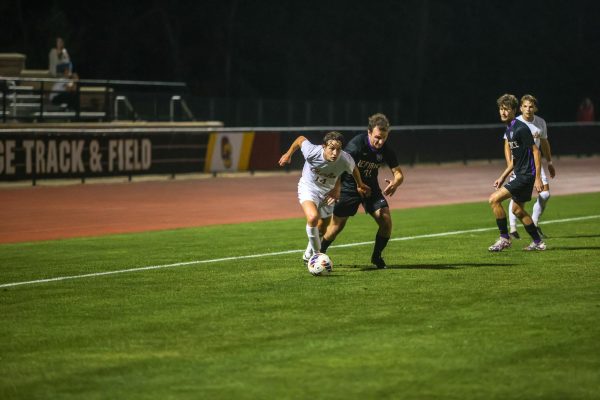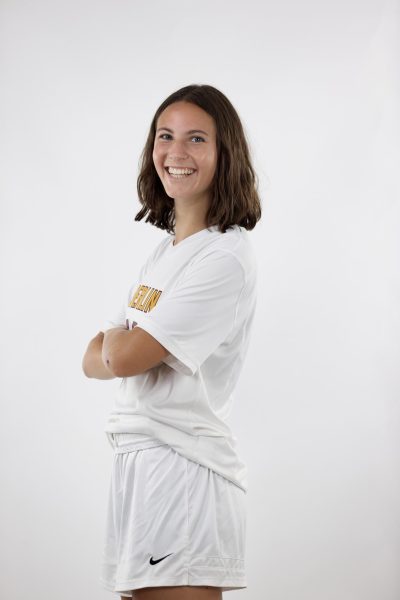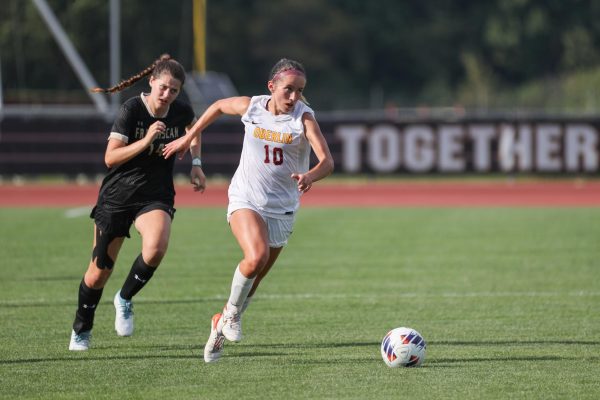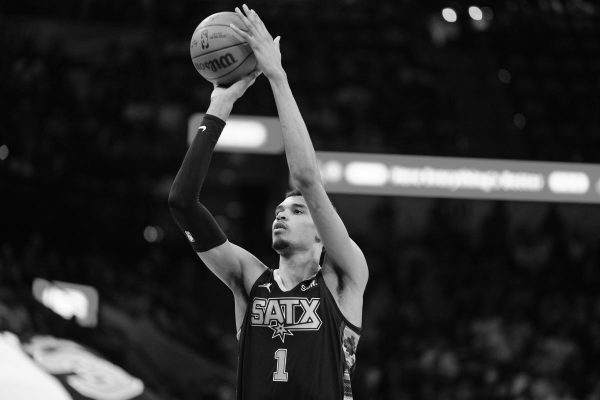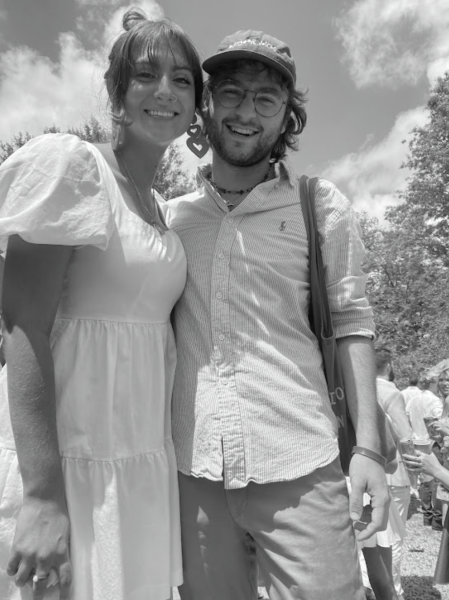Fall Athletes Face Burnout Spurred by Three-Semester Plan
Courtesy of Anisa Curry Vietze
The Oberlin women’s soccer team.
With classes amping up in intensity as students enter the second week of the fall semester, some student-athletes who have been on campus for a month and a half already say they feel burnt out. Fall athletes were required to stay on campus to practice during the September break between summer and fall semesters, but this back-to-back schedule has been taxing for some.
Fourth-year volleyball player Lauren Fitts says she started feeling burnt out before classes even began and now, with school in full swing, the stress has definitely increased. Fitts, who is from California, hasn’t been able to travel back home, where she feels most comfortable, since February.
“I’ve had no time to relax and feel like I’m being stretched so thin,” she said. “The upside is that our season overlaps with this semester a lot less than it has in the past, so hopefully it will be more manageable.”
For fourth-year soccer player Nic Jandeleit, the fall semester has been going very well so far. He is feeling reinvigorated now that the whole student body is back on campus.
“Despite being here for the spring and summer semester, I feel very motivated for this fall,” Jandeleit said. “The addition of everyone returning has brought energy to this campus that hasn’t been here since we were sent home. I’m sure there will be times later in the semester where I will feel burned out, but that’s normal for everyone.”
Fitts agrees that having a full campus is nice, but also says it’s quite a change to what she has become accustomed to over the past month.
“It is nice seeing a full campus again, but it is taking a lot of adjusting,” she said. “I kinda got used to having a relatively empty campus as it was more peaceful, but I’m happy that I will have a normal-ish senior year.”
Third-year volleyball player Lindsey Felton has also felt the burnout despite only being here for the summer semester and not the spring.
“The three-semester plan really messed me up,” she said. “Especially because I decided to stay home in California for the fall 2020 semester, it’s been hard to get back into the swing of things academically now that things are full force.”
Felton highlights that playing a sport in college is a much bigger time commitment than some may think. For many student-athletes, class doesn’t get out until 4:15 p.m. some days, and practices start at 4:45 p.m.
“You need time to walk all the way from King [Building] to the gym, go to the trainer if you’re hurt, get changed into your practice gear, and set up the nets and bring out the balls,” she explained. “Then, you need to put stuff away, shower, sometimes go to the trainer again, and eat dinner. … Practice itself is only two hours, but it’s a much larger time commitment than just those two hours.”
For Fitts, navigating the late practices with the hours that dining halls are open has been a struggle. Most student-athletes aren’t done with practice until around 8:30 p.m., but Stevenson Dining Hall closes at 8 p.m. and Fitts says the line to eat in the Rathskeller can take up to an hour.
“I feel like I’m experiencing the worst of my burnout now, and the fact that there are all these problems coming up with the way the school runs now is extremely frustrating,” said Fitts. “We’re halfway through the season and that’s almost relieving to think— but at the same time, I don’t want to think like that. I should be trying to enjoy this season and year as much as possible because it’s my last collegiate season and the last time I’ll play with this team ever.”
Jandeleit, on the other hand, thinks the break from school between the spring semester and summer semester along with the week-long break from sports in July 2021 amounted to enough time for students to recuperate.
“Break is great, but it is something that we drift away from after college,” he said. “I just see this continuation of semesters as preparation for the real world.”
Student-athletes, like any student, are free to utilize campus resources like the Counseling Center or the Student Help and Resource Exchange program. However, the athletic department has not provided any resources specifically for athletes who are feeling burnt out due to the lack of a break. Felton says her support system consists strictly of her friends.
“My friends, who were here over the summer, and I talk about being here for so long a lot,” she explained. “Most people who haven’t experienced it just say ‘Sorry, that sucks,’ or tell me I chose to be here. Being on campus for almost a year straight was not something anyone signed up for when they applied to this institution.”
While Jandeleit also acknowledges the lack of official resources, he recommends talking to your coach.
“I don’t see myself needing any of these support resources; however, we should still have them for anyone who needs it,” Jandeleit said.
If student-athletes need help finding campus resources to fit their needs, they can reach out to Assistant Director of Athletics Erica Rau by email at [email protected] or by phone at 440-775-8505.
Oberlin’s Department of Athletics did not respond to requests to comment for this story.


